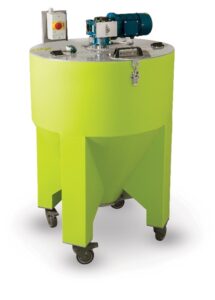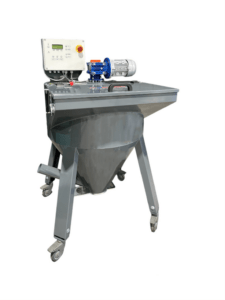Plastic Material Mixers
25/06/2025
Plastic material mixers are indispensable devices in the plastics processing industry, crucial for producing homogeneous, high-quality products. These machines, available in iron, stainless steel, or plastic constructions, offer an excellent solution for thorough material blending, ensuring consistent and uniform compositions every time.
How Plastic Mixers Work
Plastic material mixers are engineered to blend two or more plastic materials or granules, often operating at very high temperatures. The process typically involves several key stages:
- Material Feeding: Raw materials are precisely delivered into the mixing chamber.
- Mixing: A robust screw mechanism continuously stirs the plastic materials. This motion ensures even distribution and eliminates any agglomeration or separation of components.
One patented solution utilizes a perforated Fe 360 cylinder, which, combined with a conical hopper design and the screw’s vertical movement, achieves perfect homogeneity of the raw material. Once the mixing process is complete, the perfectly blended product is ready for transfer to the processing machine.
Applications of Plastic Material Mixers
Plastic material mixers are vital across a wide range of industrial sectors and manufacturing processes, including injection molding. In this context, mixers are used to combine recycled plastic with virgin materials or additives, creating new plastic compounds with specific performance characteristics tailored to various applications.
Key Advantages of Using Plastic Material Mixers
Integrating plastic material mixers into production offers numerous benefits:
- Enhanced Control & Repeatability: These mixers provide precise control over material composition, ensuring consistent and repeatable processes.
- Reduced Time & Costs: They significantly cut down on production time and operational costs associated with manual material preparation and mixing.
- Minimized Waste: By enabling the recovery and use of regrinded material, mixers help minimize production waste.
It’s critical that the mixing process yields a uniform, high-quality product. Poorly mixed plastic granules can negatively impact the strength, flexibility, and appearance of the finished product. Consistent and predictable mechanical properties are especially vital when plastic products are used in technical, engineering, and other advanced applications. Furthermore, proper mixing enhances manufacturing efficiency by reducing defects, waste, rework, and returns, thereby lowering overall management costs. Finally, a preliminary homogeneous mixing of plastic granules also helps stabilize injection and extrusion molding processes.
In essence, plastic material mixers enable the production of high-quality plastic compounds with optimal performance. Their versatility, reliability, and precise control capabilities have made them an essential asset in modern plastics manufacturing.
Available Models
- MIX PL 100-200: Mixers for plastic granules with a thermoplastic resin structure. Available in various colors and with capacities of 100 kg and 200 kg.
- MIX 70 – 150 – 230: Mixers for plastic granules with a structure made of 2 mm thick painted sheet metal. Suitable for optimal granule mixing, these models are available with capacities of 70 kg, 150 kg, and 230 kg.
Desideri ricevere più informazioni su questo articolo?
Compila ed invia il form sottostante, i nostri specialisti ti contatteranno al più presto.
Error: Contact form not found.


